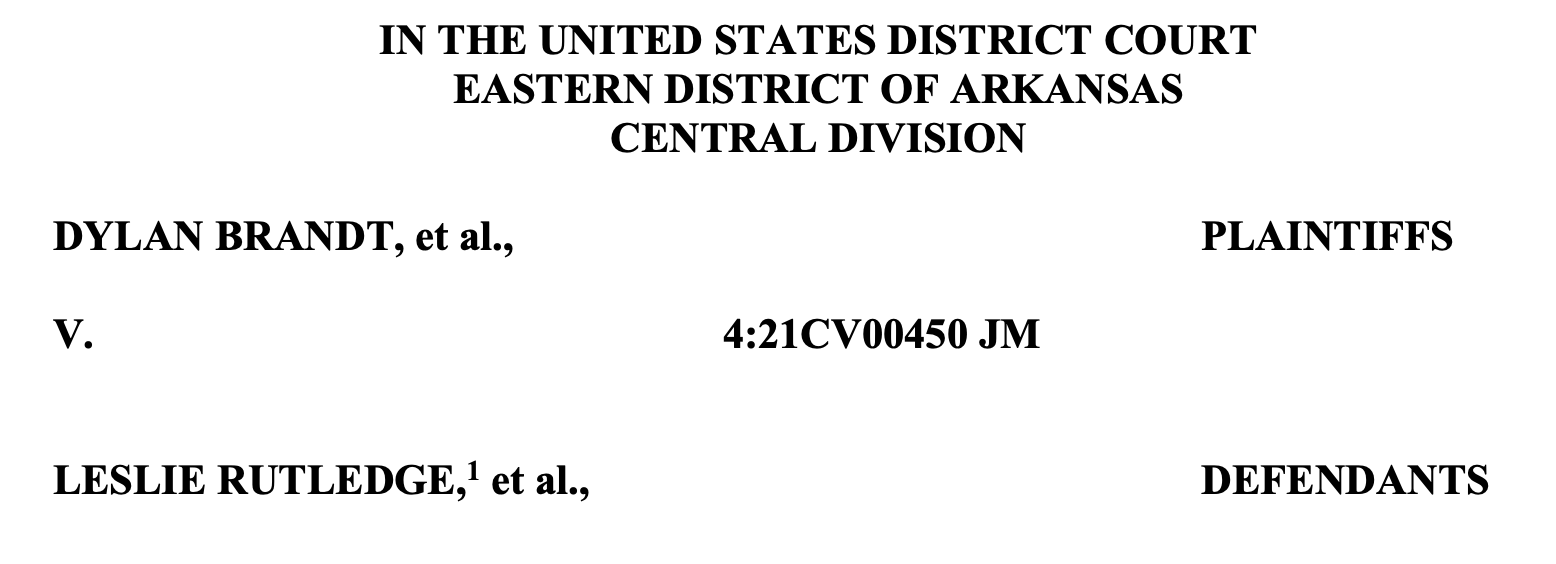Arkansas ban on gender-affirming care for minors is unconstitutional, judge rules
"Transgender care is not experimental care," a federal judge found after trial, ruling for the challengers "on all claims" in a first-of-its-kind decision.
Arkansas’s 2021 law banning gender-affirming medical care for minors is unconstitutional, the federal judge who has been overseeing the challenge to the law ruled on Tuesday, finding in favor of the plaintiffs and against the state “on all claims.”
Although there have been three other federal court rulings granting preliminary injunctions against such bans (in Alabama, Florida, and Indiana), in addition to earlier rulings as to the Arkansas law, such decisions are — as they suggest — preliminary.
Tuesday’s ruling, though, is the first final judgment from a trial court in a challenge to such a ban. It followed a two-week trial in a case that has traveled a long path — one that is still not over.
The law “is unconstitutional,” U.S. District Judge James Moody Jr. stated in the opening paragraph of his 80-page ruling in the case, siding with the plaintiffs on equal protection, due process, and First Amendment grounds.
While a final trial court ruling in the case, Arkansas Gov. Sarah Huckabee Sanders has already announced that the state will appeal.
While Moody’s ultimate ruling in the case and legal conclusions obviously matter, his findings of fact issued Tuesday could be the most important aspect of his decision. Because trial judges are able to review the evidence and are closest to the case at trial, their findings of fact are accepted on appeal unless the appeals court finds that the those findings constitute a “clear error,” a deferential standard.
After detailing the evidence presented by the parties regarding the World Professional Association for Transgender Health (WPATH) Standards of Care and Endocrine Society’s guidelines for care, Moody — an Obama appointee who has been on the bench since 2014 — found as a fact: “Transgender care is not experimental care."
In addressing gender-affirming medical care studies and effectiveness, Moody found:
Then, significantly, Moody found, “There are no other evidence-based treatments besides those prohibited by Act 626 that are known to alleviate gender dysphoria.”
As to the effects of the law on minors in Arkansas specifically, he found, “For those adolescents who are already being treated with puberty blockers or hormone therapy and who would be forced to discontinue treatment, experts on both sides agree that the harms are severe.”
Finally, Moody identified significant problems with the state’s selected experts:
“The Court does not credit the testimony of Professor [Mark] Regnerus and gives it no weight because the Court finds that he lacks the qualifications to offer his opinions and failed to support them.”
“Dr. [Patrick] Lappert does not meet the requirements under Daubert to give opinions relevant to this case.”
“Dr. [Paul] Hruz has never treated a patient for gender dysphoria.”
Even as to the one state expert who Moody found to be “a very credible witness,” Dr. Stephen Levine, the Moody also found that Levine “struggles with the conflict between his scientific understanding for the need for transgender care and his faith.” Despite that conflict, Moody noted that Levine “does not support banning gender-affirming medical care for adolescents with gender dysphoria.”
In his legal conclusions, Moody ruled first on the equal protection challenge, concluding that Arkansas’s ban “discriminates on the basis of sex” and “discriminates against transgender people.”
After examining the state’s claimed interests, he concluded that “the State has failed to meet its demanding burden of proving the Act advances its articulated interests,” leading Moody to rule that the law “violates Plaintiffs’ rights to equal protection.”
Moody then examined the due process claim. As other recent rulings have noted, despite the focus from American opponents of gender-affirming medical care on European responses, “None of these countries have imposed a ban on all gender-affirming care.”
Because of the extreme steps the Arkansas law takes to create a complete ban, Moody ruled the law also “violates the Parent Plaintiffs’ rights to substantive due process.”
In addressing the First Amendment challenge to the provision barring doctors or other health care professionals from even referring patients for gender-affirming medical care, Moody concluded that “the State has failed to prove that its interests” — claimed interests in the safety of Arkansas adolescents regarding gender-affirming medical care and “the medical community’s ethical decline” — “are compelling, genuine, or even rational.”
Because of all that, Moody issued a permanent injunction barring state legal and medical officials from implementing the law.
Moody then also entered the court’s final judgment in the case.
As Huckabee Sanders stated, the state will appeal — but the case will be heading to the U.S. Court of Appeals for the Eighth Circuit, which already upheld the initial preliminary injunction against the law.
Additionally, while Moody’s ruling creates no precedent for the other similar bans across the country because it is only a district court ruling, expect to see it — and all of its factual findings — cited in lawsuits and other rulings across the nation.
This is a breaking news story. Check back at Law Dork for updates.
This report was updated and expanded after initial publication, and a correction was made regarding the standard of review on appeal for findings of fact. The final update was made at 10:30 p.m.








Bravo. Let's hope we keep moving in this direction in all the offending states. These anti-trans laws need to become yet another shameful part of our history.
The Court destroyed all of the State's experts as entirely unqualified to offer an opinion except one, and as to the latter, pointed out that he struggles with his faith as it relates to the standard of care.
Also interesting is how the Court went out of its way to note how Alliance Defending "Freedom" - a/k/a fascists - recruited the "experts."